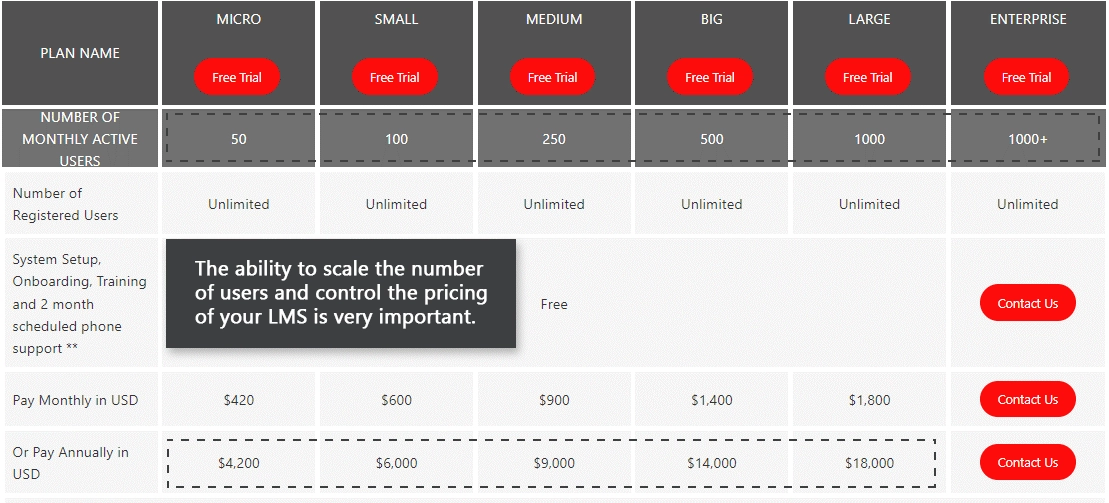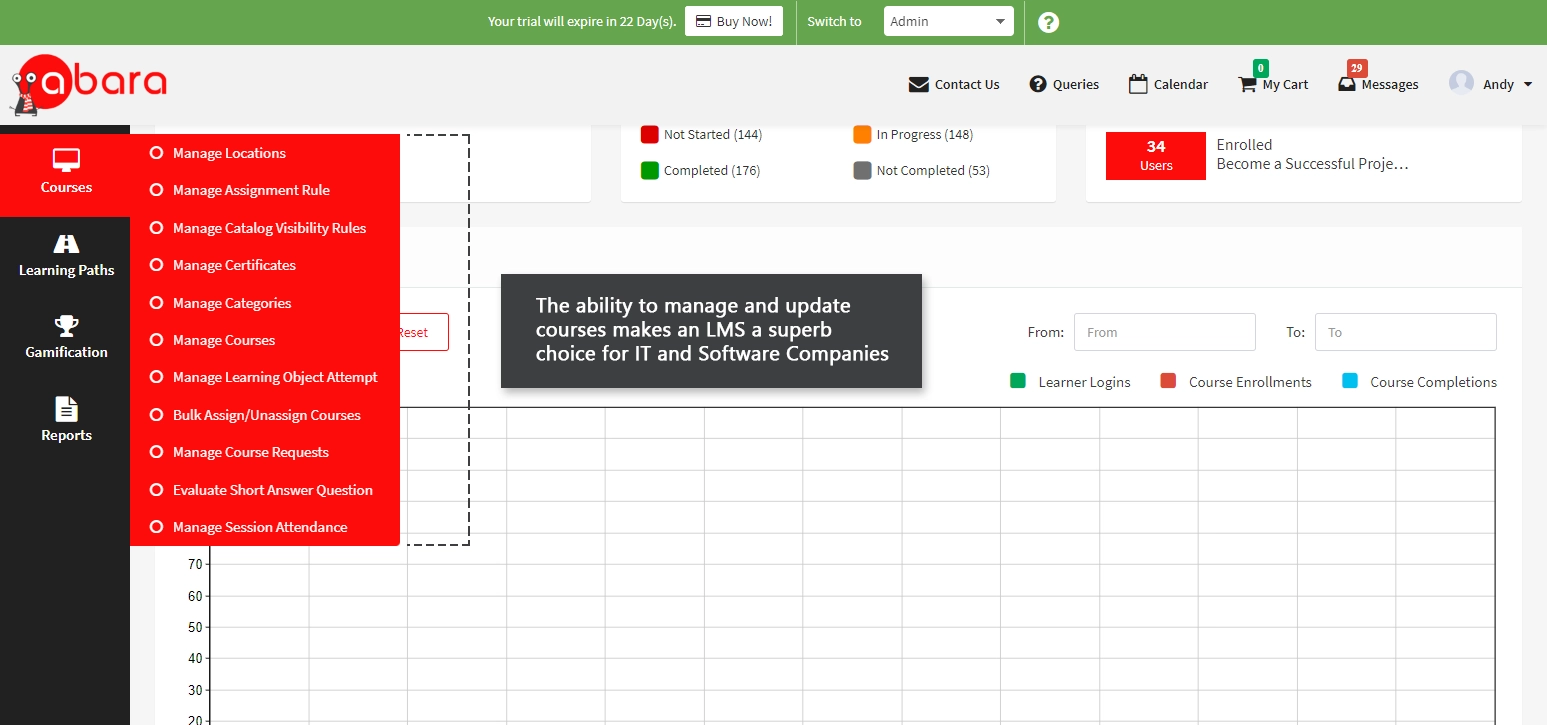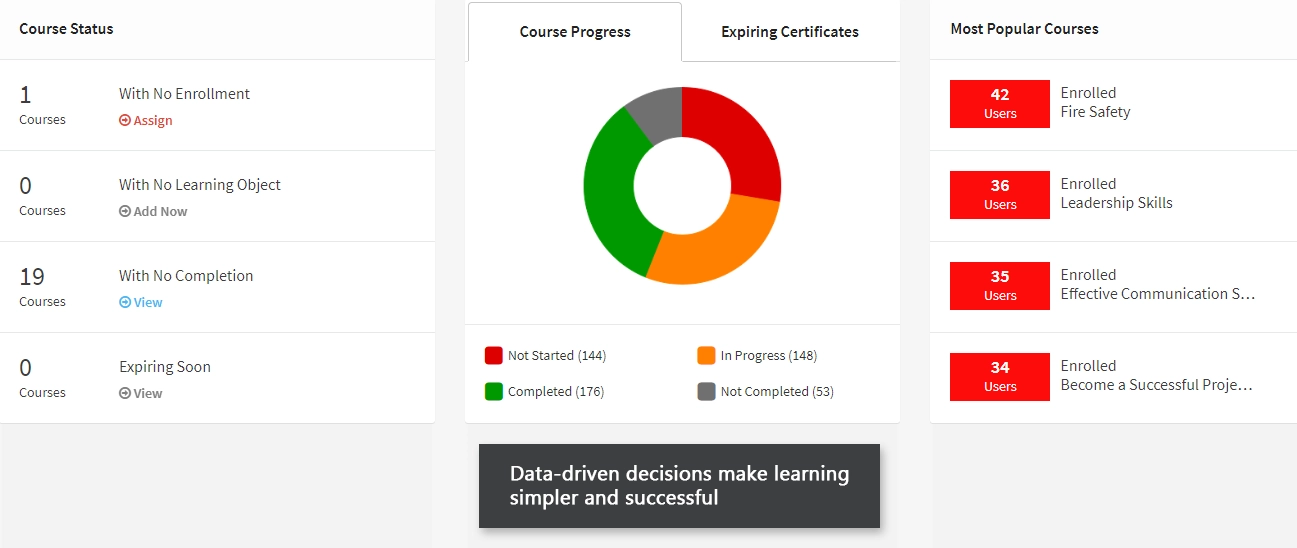The benefits of an LMS for Information Technology and Software Companies are many, from tracking learner progress to breaking down complex topics, the list is endless. IT and software company employees are tech-savvy individuals who certainly prefer training a certain way, and that is the hi-tech way. As a result, an LMS to train information technology and software development professionals is a match made in heavens, let us dive deeper!
For the uninitiated, a corporate Learning Management System or an LMS is a software platform that expedites the administration, delivery, and analysis of an organization’s training programs by method of using eLearning-based training content loaded on the LMS. Many learning management systems are cloud-based software solutions that organizations adopt as the cornerstone to their corporate training programs.
The LMS has become an astonishingly powerful tool for companies looking to enhance the performance and engagement of their workforce. In fact, a learning management software in 2022 is considered an organization’s core software. You can think of the LMS as software sitting right up alongside the likes of a CRM, ERP, HRMS, and more. It is at the heart the efforts of the Learning and Development (L&D) department, similar to how the HR teams use HRMS software, and the sales teams depend on CRM software.
On this Page
THE GLOBAL ADOPTION OF LEARNING MANAGEMENT SYSTEMS
Employee-focused companies are adopting Learning Management Systems across the globe. The main growth catalysts for the LMS market include the increasing adoption of digital learning, the near-universal trend of ‘Bring Your Own Device (BYOD),’ and the growing desire of organizations to drive business decisions based on data.
A study by Markets and Markets claims that the LMS market size was foreseen to grow from USD 9.2 billion in 2018 to USD 22.4 billion by 2023, at a Compound Annual Growth Rate (CAGR) of 19.6% during the forecast period. Clearly, there are big indicators that seem to point in this direction.
While any organization across all industries can benefit from using an LMS, we are taking a look at the information technology and software sector. Since this industry is prone to big changes on a regular basis, it seems like the workforce that comprises this industry stands to benefit most from technologies such as the learning management system.
Information technology and software companies in particular have a critical need for training employees and new hires. IT companies are under constant pressure to stay ahead of the competition. In that scenario, having a robust Learning Management System in place can help tremendously to address the training needs in a centrally managed, automated, and time and cost-effective way.
LMS FOR INFORMATION TECHNOLOGY AND SOFTWARE COMPANIES
-
Scalability
An LMS is both scalable and cost-effective. Large tech companies or IT departments for multinationals, usually have multiple offices across numerous cities, states, and even countries. For such companies, installing a single, low-cost LMS to train all of their employees across different departments and even geographical locations can help drive eLearning training programs that are far more beneficial than traditional classroom-based training methods. More important is the LMS’ ability to scale with the increase or decrease in the number of learners or employees who are registered as formal users of the LMS and on the basis of whom the company pays for the LMS.

One can never undermine the LMS’ ability to scale with the number of users which makes it much better than any standard training option that an information technology company currently has. It’s also important to note that merely expecting IT professionals to learn by enrolling on third-party training platforms is simple, but it gives your company very little control over administrating their progress, difficulties, and overall performance.
Hosting training that is central to your company’s success on its own LMS and tracking learners and their progress is the better way to ensuring your employees are constantly updating themselves. -
Flexibility
Have a Learning Management System in place saves your employees from the stringent schedules of classroom training and grants them the flexibility to learn at a time and place of their convenience. In the fast-paced world of technology, it is essential for companies to reduce disruption and provide flexibility to employees whose performance has to be on the top of the game at all times.
 Flexibility also ensures your complete control over what learners are consuming as a part of their training. Many information technology and software companies are often caught asking their learners to enroll and undertake training on third party commercial platforms such as Udemy and the likes. While such training seems cost-effective in the short run, the cost to train many thousands of employees on an ongoing basis quickly adds up. Additionally, these training platforms are built and designed to upsell and cross-sell more of their products, which is done by creating marketing traps to lure learners into taking additional courses. Now, not only is this highly distracting to learners but it can potentially cost your organization big bucks if not controlled and administered effectively.
Flexibility also ensures your complete control over what learners are consuming as a part of their training. Many information technology and software companies are often caught asking their learners to enroll and undertake training on third party commercial platforms such as Udemy and the likes. While such training seems cost-effective in the short run, the cost to train many thousands of employees on an ongoing basis quickly adds up. Additionally, these training platforms are built and designed to upsell and cross-sell more of their products, which is done by creating marketing traps to lure learners into taking additional courses. Now, not only is this highly distracting to learners but it can potentially cost your organization big bucks if not controlled and administered effectively. -
Standardization
An LMS helps a great deal when it comes to standardizing training programs. When an information technology company is looking to train a set of professionals in a technology that is specific to an upcoming project or is the newest technology on the block, there is a major need to standardize the training for all learners within the training program. The learners who are expected to follow suit after the first batch are trained also need to be trained in a standardized manner. This is to ensure that all employees are in complete synchronized harmony when they resume working on the new technology.

But this is not only applicable to learning new technologies. Information technology and software company employees will agree that processes and workflows are equally important topics on which everybody needs standardized training to ensure harmony.
An LMS simplifies the standardization of training on technologies, workflows, and processes across departments and geographies. Since many companies do need their employees from multiple sites to work in synchronization, an LMS with standardized training content on how to achieve this synchronous state of being is a superb option.
-
Hassle-free Updates
Adding, deleting, or updating online learning modules is very easy while using an LMS. All you have to do is access the LMS. Find the relevant course or course module. Make the required adjustments. Learning Management Systems also allow managers and instructors to effortlessly line up new training courses and deploy new learning programs. They can spend their energy on defining the course parameters and on creating the course rather than managing the distribution, access, and usage.

Since we have already determined that the information technology and software companies are prone to quick and major changes, it’s equally important for training administrators to address these changes by updating their training. An LMS built to train a corporate workforce is exactly the platform for such a situation. In fact, an LMS in its entirety should be easy to update and make changes to in order to address changes. Maybe add new learners to a certain course or remove specific learners from one. Create new learning paths or update the onboarding training, the list and requirements to update training are endless and only an LMS with the ability to address changes can manage it.
-
Data Driven Decision Making
Learning Management System are also highly adept tools at gathering information needed to take future decisions on the types and formats of training, while also determining who may or may not need the training. How? Well, companies require data about attendance, completion, results, etc. to measure the effectiveness of their training initiatives. Also, accumulation of this data is much easier when using an LMS.

Data is collected automatically, and reports are generated based on varying conditions and needs. By analyzing this data, companies can quickly get an overview of each course. This allows them to gauge employee progress and map the results.
This analysis, in turn, helps the business to enhance their training and achieve better results. The right kind of training makes employees more knowledgeable about the company’s offerings. It also enables them to support co-workers and become more efficient as a team.
Concluding
In the end, better-trained employees benefit the business and elevate the bottom line. The ability to train and contribute to the success of the organization makes employees loyal. And, as we have seen these are the benefits of an LMS for IT and Software Companies.
If your interested in harnessing the benefits of an LMS for IT and software companies, write to us at contact@abaralms.com or reach out to through this form: click here m. We are a tech company ourselves and we take utmost care in ensuring your organization’s success! Happy Learning! We are also one of the oldest eLearning development and design agencies with over 15 years’ experience. Visit our website to know more!

